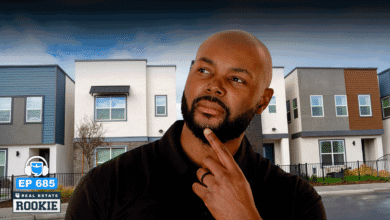
More price cuts could be coming this year. Zillow just made headlines by revising its 2025 housing market forecast, now predicting home values to drop in much of the United States. But do other top housing market forecasters agree, and if home prices fall this year, does it put you in a better position as an investor to lock down discounted deals? Dave is unpacking Zillow’s new prediction, plus sharing his own take on what might happen next.
This is not the first time Zillow has revised its 2025 housing market forecast. They’ve updated their predictions several times throughout the year, with the newest release being the most negative for home prices. Some markets in the US are even predicted to see drops of up to 10%—other markets could have price growth, while the rest of the nation struggles.
What’s causing the downward trend in home prices? Is it tariffs, inflation fears, signs of a recession, or just too much housing supply and insufficient demand? We’re breaking it down in this episode. If you plan on buying or selling this year, don’t miss this.
Click here to listen on Apple Podcasts.
Listen to the Podcast Here
Read the Transcript Here
Dave:
Zillow made some big news last week as they revise their housing market forecast and are now predicting housing prices to fall on a national level. But do they stand alone? What about other forecasts? What are other experts saying? And if prices do wind up falling and the buyer’s market expands, is that a good thing or a bad thing for investors? Hey everyone, it’s Dave Meyer, head of Real Estate Investing at BiggerPockets, and in today’s bonus episode of the BiggerPockets podcast, I’m going to update you all on how experts from across the country are reacting to recent economic changes and how they are interpreting the potential impacts for the housing market. I’ll also give you my take on what it means for investors and what my personal predictions are. Let’s jump right in. So the big story making its rounds over the last week was about Zillow, and you may have heard me talk about this on the show before, but Zillow actually puts out a new housing market price forecast every single month predicting what’s going to happen for the next 12 months going forward.
So the forecast that just came out in April actually shows what they expect to happen between the period of March, 2025, up until March of 2026, and for that time period, Zillow is now predicting price declines, at least on a national level. They think housing prices are going to fall negative 1.9%, and this forecast change is notable for a lot of reasons. You probably see tons of headlines, people predicting one thing or another, but I actually think this story is worth talking about for a couple of reasons. First and foremost, just one month prior, Zillow was predicting that the housing market was going to grow albeit very modestly. It’s not like they were saying we were going to have some banner year in the housing market. They thought it was going to grow at point to 8%, so just under 1%, but this is a continuation of a trend that we’ve been seeing for the last couple of months.
Back in January, Zillow thought the housing market would grow 3%. Then in February it was down to 1.1%. Then in March it was down to 0.8%, and now in April they’ve had the biggest change down to negative 1.9%. That is a pretty big shift in trend that we’re seeing in just a couple of months and say what you will about estimates. I know most people in real estate are pretty skeptical about estimates and their ability to accurately predict the prices of any individual home, but I got to give Zillow credit where it’s due over the last couple of years. Their housing market predictions, sort of the big picture, aggregate predictions of what was going to happen to national housing prices have been pretty accurate, at least for the last couple of years. They’re certainly not perfect, do not get me wrong, but they have gotten some of the more sort of optimistic predictions over the last couple of years, right?
So seeing them turn their forecast negative is pretty notable. I should also say that even though you’re probably seeing a lot of headlines about this, a 2% drop in national housing prices is a correction. It’s a normal thing that happens in the economy if it is contained to that level of price decline. If we saw it go down 5%, 10%, I would be saying something different. But if Zillow does turn out to be right, we get a 2% correction that is relatively normal in the course of economic event. So this is not some forecast of a crash or an apocalypse or anything like that, but it is worth talking about and we should dive deeper into this issue and discuss why Zillow is downgrading its forecast. What regions could be hit hardest and do other forecasters actually agree with Zillow’s predictions? Let’s start with that first question of why is Zillow downgrading its forecast?
Downgrades are coming from basic fundamentals of the housing market. This is not some crazy anomaly or some trend that they’re trying to jump on. This is basically the continuation of a lot of trends that we’ve been seeing and talking about in the housing market for the last several months or really even the last several years. Supply is increasing. We are seeing more people list their properties for sale in the form of new listings and inventory is up depending on who you ask, it’s up 15 to 20% nationally. That is really important. We are not at pre pandemic levels, but any increases in inventory from the super low levels that they were at during the pandemic is notable. And it’s important that this is also happening at a time where affordability is constraining demand. High mortgage rates, high housing prices means that even though a lot of people want to buy homes they just can’t afford to right now, mortgage rates were starting to come down a bit through the first quarter of 2025, but they’ve gone back up.
They’re now in the high sixes, low sevens as of this recording. And the outlook for mortgage rates is super, super unclear. I think it’s really uncertain what happens from here, but as of this recording, we are seeing that affordability challenges remain and when you have constrained demand due to low affordability plus increasing supply, that is going to put downward pressure on the housing market. So it’s not like Zillow again, it’s not like they’re saying something crazy here. They’re just saying that these trends that we’ve been seeing for the last couple of months, last year or two are going to continue. It sounds like they think they’re maybe going to accelerate and that’s driving their change from 3% growth that they were predicting in January to now nearly a 2% decline that they’re predicting here in April. But as we regularly talk about on this show, this idea of a national housing market, it’s sort of overblown, right?
There is a national housing market and broad trends do really matter for macroeconomics for some decisions that we make as investors on resource allocation and things like that. But what really matters, I think to most investors or what’s going on in their regional market because as I’m about to share with you, what happens in one market is super different from what can happen in another market and the differences are pretty big right now. Zillow has actually given us some ideas of where they think prices are going to head in individual regions and individual markets, and there are still markets projected to increase. If you look at the trends, most of them are in the northeast, so their forecast for the fastest growing market as of right now is Atlantic City, New Jersey that is projected to rise 2.4%. You see places like Kingston, New York at 1.9, Rochester, New York at 1.8.
We have Knoxville, Tennessee, which is still up there for the one place out of New England, but pretty much everything else is in either New England or New York. So we do have these places that are going to grow, but it’s very modest, right everywhere, even the fastest growing prediction of 2.4%, that’s about the pace of inflation. Everything else is below the pace of inflation. And so if you’re looking at real house price growth, Zillow is predicting almost everywhere to fall. Now, when we look at the other side of the equation, we see some pretty dramatic drops and they’re really coming mostly on the Gulf Coast. Actually the top six places with projected declines, at least according to Zillow, are all in Louisiana and all of the top 10 are either in Louisiana or in Texas. So Hamma, Louisiana projected at negative 10%. That is borderline crash territory for that one individual market, lake Charles at negative 9% New Orleans at negative 7.6%.
So these are pretty significant declines. It’s important to note that these are relatively smaller cities, but obviously if you’re investing or thinking of investing in these markets, these are really concerning numbers. This is not the type of correction that you necessarily want to be investing into unless you have a well formulated strategy. But I would be personally pretty concerned about investing in any of these markets. But when you zoom out and look at the big picture, and I’m actually literally looking at a big picture right now. I’m looking at a heat map of the entire United States, and what I see, at least according to Zillow is that they’re projecting the majority of markets to be what I consider flat. That’s somewhere in the negative 2% to 2% growth range. To me that’s flat. I think it’s really hard and sometimes futile to project, oh, it’s going to go up 1% versus negative 1%.
That level of difference, that margin of error, it’s two small. I think when I look at these markets and so many of them are somewhere between negative two and 2%, I would categorize almost all of those as relatively flat, and that’s actually pretty to what I predicted back in November and December for the housing market this year. I basically said I thought we were going to see relatively flat on a national basis with most markets between negative three and 3%. That’s sort of what Zillow is predicting. Maybe just some more extremes on the downside, like those places in Louisiana that I just mentioned. I should also say on top of Louisiana, Texas, there are some forecast declines in places like Northern California and there’s some softer spots in Arizona and Colorado, some concentrated areas and there’s some scattered around the country as well. But those are some of the regional trends that I’m seeing.
On the positive side, pretty much the only areas of positive growth I’m seeing are in New England, but again, those are very modest. I’ll get more into my own thoughts about this, but I’ll just say I actually am kind of surprised by some of the negative forecasts in the Midwest. Those markets are still really strong right now, so Zillow must be seeing something that I am not, I’m not saying those markets are going to grow really rapidly, but I see resilience in a lot of those markets. I think that I wouldn’t be surprised to see some areas in the Midwest growing as well through the next 12 months. That’s it. That’s the full picture of what Zillow is saying. That’s what’s been making so much news over the last week, but obviously they are just one company and when we come back from this break, I’ll share with you what other forecasters are saying and give you my own opinions on the market as well. We’ll be right back.
Welcome back to the BiggerPockets podcast. I’m here reacting to the news that Zillow has turned to somewhat sour on housing prices, but since they’re obviously just one company, I want to dig into what other big forecasters are saying and also discuss if Zillow is right and prices do actually wind up declining. Is that even a bad thing? Let’s keep digging in. I looked across the entire media market of forecasters and found that the majority of forecasters still think that housing prices are going to go up This year I looked at Fannie Mae, they are still predicting at least as of March, a 1.7% increase in housing prices throughout 2025. Wells Fargo thinks the case shilla will rise 3%. JP Morgan is up about 3% as well. But I think it’s important to note that most of those forecasts, I think actually all of those forecasts came about before the liberation day tariffs and a lot of the turmoil that we’re seeing in the economy throughout April.
So we’ll keep an eye on whether or not that changes people’s forecast, but as of right now, the most recent forecast we have for the majority of these big companies that maintain these complex economic models, these complex housing market models, so think that prices are going to go up somewhat modestly here in 2025. So I think it’s important to remember to take what Zillow is saying with a grain of, because all of these companies use different methodologies and really none of them are perfect. But again, I just think because Zillow people always sort of criticize Zillow, they’re like, of course they’re predicting a positive housing market outcome. Their business depends on that. So I do think it’s important to recognize that they are now one of the only companies predicting falling prices. Now, if you care what I think, I don’t really think that Zillow’s predictions are all that unreasonable.
I again, made some informal predictions at the end of last year and I predicted this sort of broadly flat environment for most of 2025, and I still think that’s the most likely outcome. Now, where we fall in that spectrum on national prices is hard to say given all the economic uncertainty right now, it is very difficult even in the best of times to predict the national market with the high degree of confidence, but given how uncertain and how rapidly changing everything is right now, I think that’s just gotten even harder because of that, I always base my own investing decisions, my own predictions more on the trend, more on the direction of things than any specific number, right? Yes, it matters whether the housing market is at a 0% growth this year or negative 2%. That does matter to some people more than others, but for me, what matters is that it has gone from a positive appreciation environment down to a flat or potentially negative one, where the actual number lands is less important.
To me, I predicted a softer housing market, and I think that trend is exactly what’s happening here. We are seeing rising inventory, we are seeing constrained demand due to low affordability, and I don’t really see that changing very much throughout the rest of 2025 unless there’s some big black swan event or something changes really dramatically with tariffs, economic policy, monetary policy, unless we see one of those big changes. I see the current trends continuing. Now whether we end up plus 2% minus 3%, to me that really depends on the macroeconomic conditions and largely what happens with tariffs. Everyone knows this, but economically speaking, what’s going on is just super murky. We don’t know what tariffs will stick around and at what level. We don’t know if inflation will spike and by how much. We don’t know if the economy will enter a recession and if it does, how bad it will be at this point.
It’s all very unclear, but I’ll just give you a couple of thoughts just to help people understand at least how I’m thinking about this. If trade deals are worked out, Trump paused tariffs for 90 days and is supposedly working on trade deals with the countries that had these reciprocal tariffs, and if we do get lots of trade deals with our biggest trading partners, maybe inflation stays close to where it is now. Consumer confidence rebounds from three straight months of declines, and perhaps we see the market stay somewhat resilient and we’ll be in that sort of higher end of my range. Housing prices grow somewhere between one to 3% over the next year. That is one possible outcome. However, the other end of the spectrum is definitely possible. There is a lot of uncertainty right now, and if that uncertainty remains, we might see mortgage rates stay high because bond rates are high, tariffs could drag on economic growth, inflation could rise in the short term.
All of these are reasonable outcomes given where we are today, and I think if those materialized demand drops off and we see prices closer to what Zillow is predicting, which is modest declines. Now, I do think there are sort of two important follow-ups to remember here. First and foremost is that Zillow, nor I, nor really any credible source that I have seen is pointing to any sort of crash. I look at this data almost every single day and there just aren’t signs that a crash is likely, even if there is a recession and demand drops off, we would need to see forced selling for a crash to happen, and although there is always a chance that that happens, there isn’t any evidence suggesting that that is anything more than just sort of a fringe unlikely case at this point. And that brings me to sort of my last point here, which is if prices do decline, if Zillow is right and we have negative 2% growth in the housing market this next year, is that even a bad thing?
Because these types of markets are what is typically called a buyer’s market. This happens when there are more sellers than buyers, and when that happens, sellers just basically have to compete for those fewer buyers, and they typically do this by lowering prices that puts downward pressure on housing prices. Now, whether or not this is good is really all a matter of perspective. If you’re selling a home, it’s obviously not great. It also creates some difficult market conditions for flippers. It can complicate the appraisal and refinancing side of a bur, and also, if you’re one of those people who really closely follows your current portfolio value, I’m not one of those people. Yeah, your current hypothetical theoretical equity value of your properties could take a hit. Personally, I don’t care about that, but if that’s, you might see that over the next year or so, but what does this mean for long-term buyers for people who are building their portfolio right now?
For those people, I don’t think this is necessarily a bad thing. It could actually be the opportunity that many people have been waiting for. Buyer’s markets create opportunities. Don’t get me wrong, there is a lot of junk out there, but buyer’s markets allow for negotiation. They create more motivated sellers, they can make properties more affordable. Those are all good things for real estate investors do not misinterpret what I’m saying. You cannot go out and buy just anything in these types of markets that can absolutely lead to trouble, and buyer’s markets frankly do create a new level of risk in the market. This isn’t 2021 where you could just go out and buy anything and things are going to go up, but in this type of buyer’s market, good assets will be easier to obtain. If you are willing to do the work and find those great properties that are hitting the market, those are going to be there.
I feel super confident about that, that there are going to be better buys out there right now than maybe there have been over the last couple of years. You just have to sift through what could be some junk on the market as well. Now, for me, how I’m handling this is I am eagerly going to be looking at deals. My approach is going to be to try and find properties that I can buy for two, three, 4%, at least below list price, below market value, because I think that’s going to be possible. Not every seller is going to be motivated. Not every seller is going to be willing to sell under their list price, but more and more will be. That is sort of the dynamics that happen in a buyer’s market and if you’re able to find those sellers where you can buy below list price that protects you from risk of future price declines.
Again, yes, a crash is possible, but it is unlikely, and so if you can protect yourself or mitigate the risk of a 2% decline or a 4% decline, that means you might be able to gain control of a really valuable long-term asset during a period of less competition. And because I personally am investing for 10 years, 20 years from now, even if my properties decline a little bit over the next year, I’m actually okay with that as long as it’s a great asset that has high intrinsic value and has two to three of the upsides that I’m always talking about on this show. It has to have things like rent growth or zoning upside, the ability to add value or to be in the path of progress. If properties have those, I’m going to be looking at them because this is honestly a lot of what the upside era is about. Looking past short-term fluctuations and trying to acquire great assets for long-term wealth creation, and I know it can be daunting, it can be scary to see prices decline. It always catches my attention to, but since real estate is a long-term game, those who can see past those short-term fluctuations can see past the short-term uncertainty can really set themselves up for long-term success. Alright, everyone, that is what I got for you today. I hope you enjoyed this bonus episode. Thank you for listening. We’ll see you tomorrow for a normally scheduled episode.
Help Us Out!
Help us reach new listeners on iTunes by leaving us a rating and review! It takes just 30 seconds and instructions can be found here. Thanks! We really appreciate it!
In This Episode We Cover:
- Zillow’s new 2025 housing market forecast and why price declines seem likely
- The best and worst housing markets for home price growth (some could fall by 10%)
- What Fannie Mae, Wells Fargo, and JP Morgan are predicting for 2025 home prices
- Is this the start of a housing market crash, or just a break for buyers?
- What Dave is doing now to pick up more properties as home prices weaken
- And So Much More!
Links from the Show
Interested in learning more about today’s sponsors or becoming a BiggerPockets partner yourself? Email [email protected].
Source link




